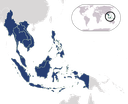Winter Term 2012/2013
- Contents
Political Science
Demokratisierung „von unten“? Zivilgesellschaft in Südostasien
Time/ Place: Tuesday, 18-20h, Arnold-Bergstraesser-Institut, Windausstraße 16, 79110 Freiburg
Language: German
Summary: Ob Umweltfragen, der Kampf gegen Diktatoren und Menschenrechtsverletzungen oder der Einsatz für die Rechte marginalisierter gesellschaftlicher Gruppen wie MigrantInnen, Frauen, Bauern oder Landarbeiter: Zivilgesellschaftliche Bewegungen in Südostasien sind so aktiv wie vielfältig. Ihre Arbeit findet dabei in einem schwierigen Umfeld statt - der (nicht unumstrittene) Freedomhouse Index schätzt von den Staaten der Region derzeit nur Indonesien als uneingeschränkt demokratisch ein. Dies erschwert auch die Partizipationsmöglichkeiten auf der regionalen Ebene; von einer „people-oriented" oder "people-centred" ASEAN kann noch kaum die Rede sein.
Das Seminar untersucht zivilgesellschaftliches Engagement in Südostasien auf der lokalen, national, regionalen und transnationalen Ebene. Neben Strategien und Erfolgen wird auch die Frage nach der Legitimität von Nichtregierungsorganisationen und Graswurzel-Bewegungen diskutiert: Leistet Zivilgesellschaft stets einen Beitrag zur Demokratie oder kann eine elitäre „uncivil society" auch Demokratie-destabilisierend wirken, wie Mark R. Thompson im Falle der Philippinen und Thailands argumentiert?
Literature:
Alagappa, Muthiah (ed.) 2004. Civil Society and Political Change in Asia. Expanding and Contracting Democratic Space. Stanford, Calif: Stanford Univ. Press.
Clarke, Gerard. 1998. The Politics of NGOs in South-East Asia. Participation and protest in the Philippines. London, New York: Routledge.
Collins, Alan. 2008. "A People-Oriented ASEAN: A Door Ajar or Closed for Civil Society Organizations?" Contemporary Southeast Asia 30 (2):313-31.
Keck, Margaret E. and Kathryn Sikkink. 1998. Activists beyond borders. Advocacy networks in international politics. Ithaca, NY: Cornell Univ. Press.
Piper, Nicola, and Anders Uhlin, eds. 2004. Transnational Activism in Asia. Problems of power and democracy. London: Routledge.
Piper, Nicola and Stefan Rother. 2011. "Transnational Inequalities, Transnational Responses: The Politicization of Migrant Rights in Asia." In:Boike Rehbein (ed.), Globalization and Inequality in Emerging Societies, Palgrave Macmillan, pp. 235-55.
Thompson, Mark R. 2007. "The Dialectic of "Good Governance" and Democracy in Southeast Asia: Globalized Discourses and Local Responses." Globality Studies Journal (GSJ) (10).
Foreign Policy and Regionalism in Southeast Asia
Manea, Gabriela , Nguitragool, Paruedee, Dr.
Time/ Place: Thursday 14- 18h (08.11.2012 till 20.12.2012) and Thursday 14-16h (25.10.2012), Hermann-Herder-Str. 9 - HS 00 018
Language: English
Summary: This course is an introduction to Southeast Asian states' regional foreign policies, especially with regard to various initiatives of regional cooperation and integration centered on the Association of Southeast Asian Nations (ASEAN). The course approach will highlight cultural and historical factors along with discussing domestic political, social and economic structures in order to explain states' regional behavior and to account for local patterns of regionalism. Theoretically, the course will introduce students to IR and regional integration theories as well as foreign policy research that condition the study of Southeast Asian regional politics. The course is divided in three parts.
The first thematic block will focus on country profile by reviewing main domestic structures, the political history and foreign policy of each Southeast Asian country. The relationship between domestic political and cultural representations and foreign policy identities of Southeast Asian states will be analyzed as such path-dependencies substantially shape Southeast Asian states' regional interaction.
In the second thematic block, regional cooperation and integration in Southeast Asia under ASEAN will be scrutinized along four issue areas: (1) ASEAN's institutional development; (2) regional political and security cooperation within ASEAN Regional Forum (ARF) and the ASEAN Political and Security Community (APSC); (3) regional economic cooperation within various initiatives, such as ASEAN Free Trade Agreement (AFTA), ASEAN Investment Area (AIA) etc., the ASEAN Economic Community (AEC) and the ASEAN Plus Three (APT) framework; and (4) regional social and cultural cooperation within the ASEAN Social and Cultural Community (ASCC) with case studies on transnational cooperation on human rights (also under APSC) and environment.
Finally, the course will take a closer look at the external relations of ASEAN and Southeast Asia with its main dialogue partners. Regional responses to global challenges as well as to external ‘power complexes', such as China, the EU and the US will wind up the analysis of regional politics and regionalism in Southeast Asia.
Apart from perusing main scholarly literature on these topics, students will be encouraged to conduct documentary and newspapers analysis.
Literature:
Acharya, Amitav (2000): The Quest for Identity: International Relations of Southeast Asia, Singapore: Oxford University Press.
Acharya, Amitav (2009): "How ideas spread: Whose norms matter? Norm localization and institutional change in Asian regionalism", International Organization 58 (2): 239-275.
Booth, Anne E. (2007): Colonial legacies: economic and social development in East and Southeast Asia, Honolulu: University Press of Hawaii Press.
Kingsbury, Damien (2005): Southeast Asia: a political profile, Oxford: Oxford University Press.
Kuhonta, Erik Martinez; Slater, Dan and Vu, Tuong eds. (2008): Southeast Asia in Political Science: Theory, Region, and Qualitative Analysis, Stanford: Stanford University Press.
Jetschke, Anja and Rüland, Jürgen (2009): „Decoupling rhetoric and practice: the cultural limits of ASEAN cooperation", The Pacific Review 22(2): 179-203.
Rodan, Garry; Hewison, Kevin and Robison, Richard (2006): The Political Economy of Southeast Asia: markets, power and contestation, Oxford: Oxford University Press.
Stubbs, Richard (2008): "The ASEAN Alternative? Ideas, institutions and the challenge to ‘global' governance", The Pacific Review 21 (4): 451-468.
Weatherbee, Donald E. (2009): International relations in Southeast Asia: the Struggle for Autonomy, New York: Rowan & Littlefield.
Registration: gabriela.manea@politik.uni-freiburg.de
Migration in Südostasien
Time/ Place: Tuesday 14-16h, KG I - HS 1009
Language: German
Summary: Südostasien ist eine der vielfältigsten und dynamischsten Regionen in Bezug auf Migration. Ob undokumentierte indonesische ArbeitsmigrantInnen in Malaysia, burmesische Flüchtlinge in Thailand oder philippinische Haushaltsangestellte in Hong Kong - temporäre oder permanente, aus Eigeninitiative geplante oder zu unterschiedlichen Graden erzwungene Migration ist für viele Menschen in der Region Teil ihres Alltags geworden. Die enormen politischen, ökonomischen, sozialen und humanitären Herausforderungen, die damit zusammenhängen, stehen allerdings in einer drastischen Diskrepanz zu den Reaktionen der betroffenen Staaten: Unilaterale Entscheidungsmuster dominieren und die ungleiche Verhandlungsmacht zwischen Entsende- und Empfängerstaaten verhindert regionale Lösungen im Sinne von good migration governance. Auch genießen für die Entsendestaaten nicht zwangsläufig die Rechte ihrer citizens abroad oberste Priorität. Andererseits preisen Institutionen wie die Weltbank Rücküberweisungen (remittances) durch ArbeitsmigrantInnen als eine zukunftsweisende Form der Entwicklungshilfe.
Auch die Politikwissenschaft hat auf die Herausforderungen durch Migration, einem prägenden Merkmal der Globalisierung, bislang nur unzureichende Antworten gegeben: Migration wird oft als Sicherheitsdilemma betrachtet, es dominiert das Bild von nationalstaatlich verfassten „Container-Gesellschaften". Zur Analyse der vielfältigen Migrationsphänomene in der Region greift das Seminar daher auch auf soziologische und ethnologische Ansätze zurück, die über die klassischen Migrationstheorien wie push- und pull-Faktoren, Lohndifferentialhypothese oder Weltsystemtheorie hinausgehen. Insbesondere neuere transnationale Ansätze können helfen, die Lebensrealität aber auch das politische Engagement von MigrantInnen in und aus Südostasien zu erfassen.
Literature:
Zu einer ersten Einführung in die Migrationsforschung gut geeignet:
Pries, Ludger (2001): Internationale Migration, Bielefeld: Transcript Verlag.
Umfassendes Standardwerk:
Castles, Stephen and Mark J. Miller. 2009. The Age of Migration. International Population Movements in the Modern World. 4th ed. Basingstoke: Palgrave Macmillan.
Übersicht über Migrationsdynamiken in der Region:
Ananta, Aris/Arifin, Nurvidya (2004): International Migration in Southeast Asia, Singapore: ISEAS.
Special Issue “Migration and Integration in the Asia-Pacific” of the International Journal on Multicultural Societies (IJMS), Vol. 9, No. 2, 2007. Download unter www.unesco.org/shs/ijms/vol9/issue2
Online auf Deutsch und English verfügbar:
Global Commission on International Migration (2006): Migration in einer interdependenten Welt: Neue Handlungsprinzipien. Bericht der Weltkommission für Internationale Migration. Deutsche Ausgabe, Berlin.
Fallstudie zur politischen Dimension:
Piper, Nicola and Stefan Rother. 2011. "Transnational Inequalities, Transnational Responses: The Politicization of Migrant Rights in Asia." In:Boike Rehbein (ed.), Globalization and Inequality in Emerging Societies, Palgrave Macmillan, pp. 235-55.
Social and Cultural Anthropology
Anthropology of Police. Statecraft, Police, and Society in Southeast Asia
Time/ Place: Tuesday, 14-16h, Werthmannstr. 10 - HS 01 009
Language: English
Summary: This course provides an anthropological approach to Southeast Asia using the theme of the police to examine the interaction between statecraft and society. Since the state is routinely defined by its capacity for the legitimate use of force within its borders, police offer an evocative lens from which to examine how states work. Southeast Asia serves as a particularly relevant region for this focused examination. Police and social order are intertwined within the history of the area from the Thai and Filipino police forces “professionalized” by the United States to the Burmese military government’s contemporary transformations to the ongoing state security consolidations in Cambodia. An understanding of domestic social control is critical to the understanding of Southeast Asia whether looking at the history of colonialism through the development of local constabularies or international campaigns against insurgency, narcotics and terrorism. Not only will students in this course identify patterns of police organization and practice, they will also explore case studies in police-based statecraft. Examining these regional case studies will promote a greater understanding of the global expressions of state control, media/state symbiosis, violence, and a myriad of other phenomena illuminated through the cultural lens of the “police” concept.









